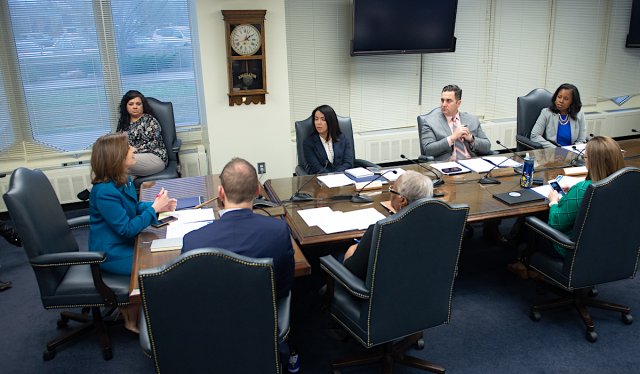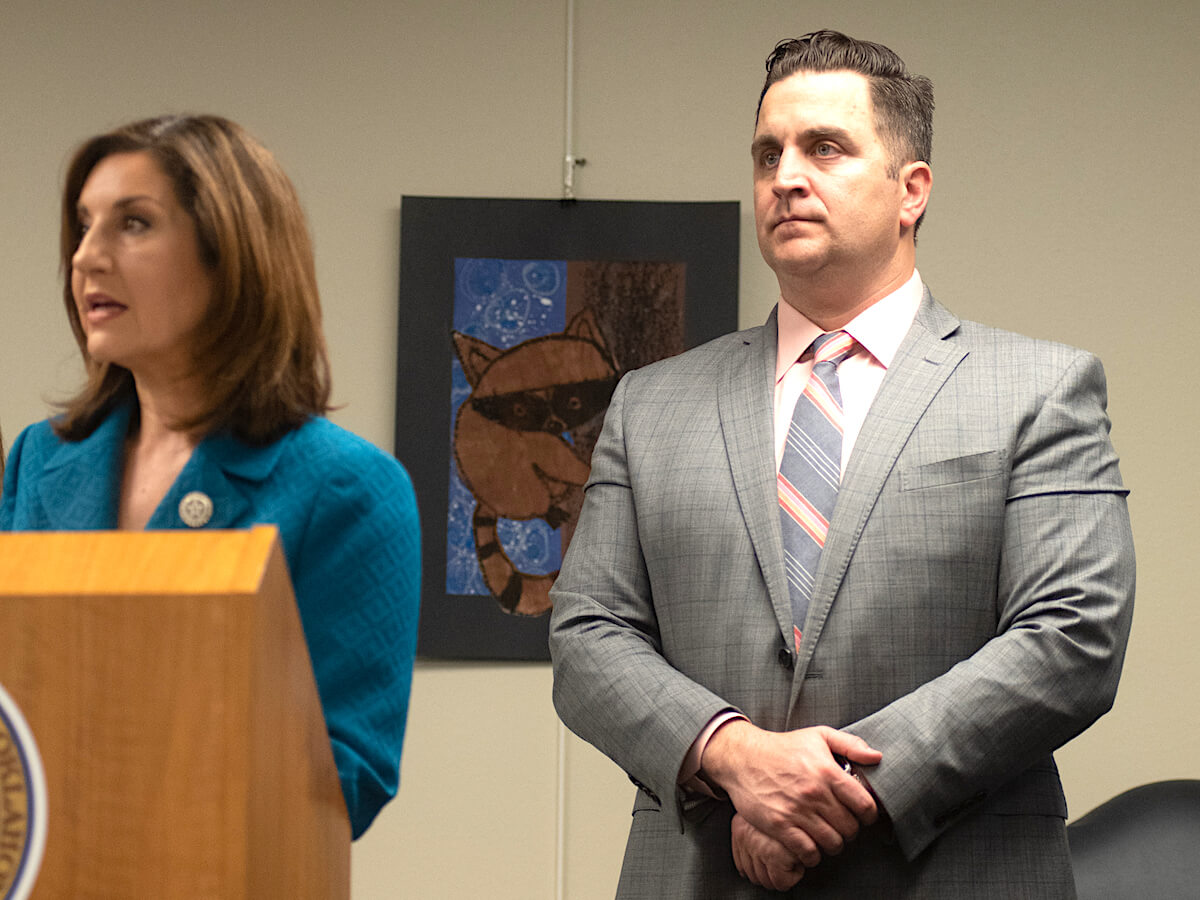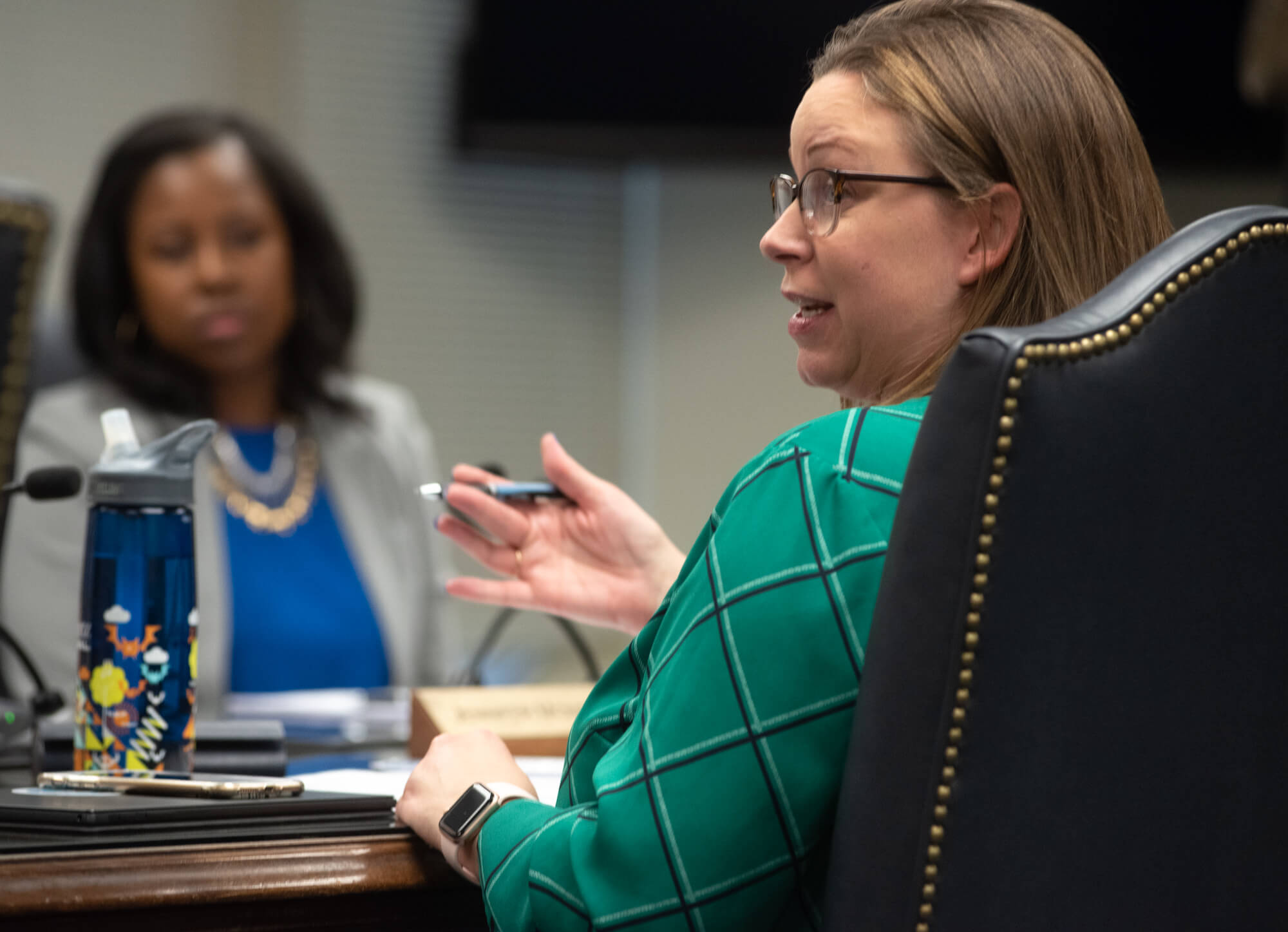
When Gov. Kevin Stitt’s most recent appointee to the State Board of Education, Trent Smith, successfully moved to approve a sweeping resolution about charter school funding at a March meeting in an effort to settle a 2017 lawsuit, State Superintendent of Public Instruction Joy Hofmeister called the move “unexpected.”
“This is a radical departure from following the law. Instead, it is really an outrageous step in creating law,” Hofmeister said, emphasizing that the Oklahoma Legislature is tasked with creating state statute regarding education policy. “That process has been stripped away and, instead, four Gov. Stitt appointees chose what they wanted and just did it.”
Hofmeister’s comments touched on a question that had been brewing for some time: Does the governor have too much influence in determining how State Board of Education members vote?
“We believe all appointed board members of state agencies should be acting in the best interest of Oklahomans,” said Alicia Priest, president of the Oklahoma Education Association. “When it comes to the State Board of Education, it’s very important that board members are acting on behalf of public school students and public school employees, and not a political ideology contrary to the mission of the State Department of Education.”
Priest’s organization, which represents thousands of state teachers, criticized the charter school funding resolution approved March 25 by Smith, Jennifer Monies, Brian Bobek and Estella Hernandez, all four of whom were appointed to the State Board of Education by Stitt. (One Stitt appointee, Carlisha Bradley, joined Hofmeister and William Flanagan, the only appointee of Gov. Mary Fallin still on the board, in voting against the resolution.)
The Oklahoma Public Charter Schools Association had filed its lawsuit seeking more equalized charter school funding in 2017, and Smith called it a “huge financial liability” for the State Department of Education, which the board governs.
Oklahoma’s governor appoints six members of the State Board of Education, which is chaired by the state superintendent of public instruction, a statewide elected position. In 2011, the Legislature modified the law governing board membership to specify that members “serve at the pleasure of the governor.” Fallin used that change to replace two board members in September 2011.
Critics, however, wonder whether a State Board of Education beholden to the governor’s wishes can fully carry out its purpose of overseeing and guiding Oklahoma’s public schools for the good of their students.
‘We certainly want our appointees to think the way we do’

This issue bubbled up in December, when the governor abruptly removed board member Kurt Bollenbach, whom Stitt had appointed in April 2019. Stitt made it clear that Bollenbach had been dismissed because he had opposed allowing Del City-based Christian Heritage Academy to participate in the Lindsey Nicole Henry Scholarship Program — a position with which Stitt disagreed.
The board’s legal counsel, Brad Clark, had said he did “not feel confident” that Christian Heritage Academy met the nondiscrimination requirements for program participation following the enactment of a 2019 federal executive order regarding discrimination based on religion, age, gender or sexual orientation.
Attorney General Mike Hunter released an opinion Dec. 3 saying the executive order did not apply, and Bollenbach was removed from the board the same week. The state board approved CHA’s application to participate in the Lindsey Nicole Henry Scholarship Program at a Dec. 17 meeting.
“Those board members serve at the pleasure of the governor, and when the vote came out that we were denying to some Christian schools in Oklahoma the Lindsey Nicole Henry (Scholarship), and they’d kind of gone against what the attorney general had said, we’re going to follow the rule of law in Oklahoma,” Stitt told NonDoc when asked about Bollenbach’s dismissal. “I think you’re seeing that play out when we saw the attorney general’s opinion.”
Several Democratic lawmakers released a statement opposing Bollenbach’s removal.
“Boards are meant to advise and provide oversight to the agencies they serve,” House Minority Leader Emily Virgin (D-Norman) said in the statement. “The governor, while choosing to replace board members as they move away from his point of view, is not using the State Board of Education as a tool to advise or provide oversight to our education system. He is using it to undermine the authority of Oklahoma’s elected state superintendent. This is another example of what has been the governor’s biggest success since being inaugurated, which has been his ability to centralize power.”
At a press conference before Bollenbach’s dismissal, Stitt did not mince words about his approach to appointments.
“We certainly want our appointees to think the way we do and to encourage all the things that we’re talking about,” Stitt said in November. “So I assume they would be right in line with where my beliefs are.”
Frustrated by the situation, Democrats introduced SB 157 during the 2021 legislative session, which would move board members from serving “at the pleasure” of the governor to a status where they could be removed only for a series of causes. The bill advanced out of the Senate Education Committee on Feb. 2 but did not receive a Senate hearing.
‘Any vote (…) is what I think is best for kids’

Only three of the six appointed State Board of Education members — Monies, Smith and Flanagan — agreed to be interviewed for this story. Board members Bobek, Hernandez and Bradley did not respond to multiple requests for interviews.
Monies and Smith both were appointed by Stitt and said they are not overly concerned about the governor’s influence.
Flanagan, who was appointed to the board by Fallin in 2015, has agreed with and opposed Stitt’s positions over the past year. Like the governor, he opposed a statewide school mask mandate, but he opposed the charter school funding resolution.
“I got involved because I was concerned with overall education for a long time. It’s just one of the things I thought we could be doing better.” Flanagan said. “My state senator approached me about filling this position on the board, and that’s how I got involved.”
Monies, who was appointed in 2019, said she believes the board functions well.
“I’ve been involved with the State Board of Education for a long time, and it’s a very engaged board that we have right now,” Monies said. “I know we all do a lot of talking to education people that we know (and) the State Department of Education before every meeting. There are a lot of conversations that happen on various issues that are going to be on the agenda, which is hopefully standard procedure for most boards.”
Monies added that she has not personally experienced untoward influence from Stitt.
“For me, personally, the governor’s office has never put any undue pressure to vote a certain way on anything on the agenda during my time on the board,” Monies said. “I get the perception that that would be the case. But, frankly, I don’t even know how many (total) appointments he has. I’m sure it’s in the thousands. It hasn’t been the case for me as far as feeling any pressure from the governor’s office to vote one way or the other.”
As the senior director of public affairs for the OKC public relations and marketing firm Saxum, Monies also has professional ties to the state’s executive branch. Since January 2019, Saxum has held contracts with the:
- Oklahoma State Department of Health
- Oklahoma Lottery Commission
- Oklahoma Department of Human Services
- Oklahoma Employment Security Commission
- Oklahoma Tax Commission
- Office of Management and Enterprise Services
Saxum’s contracts with those six state agencies have totaled nearly $6.7 million between January 2019 and January 2021, although that number includes almost $5 million in advertising purchases for the Lottery Commission. (A Saxum spokesperson said those media purchases included no commission for the company, which netted $377,000 in 2019 and $288,000 in 2020 from the Lottery Commission contract.)
The contracts for OSDH and OESC involve project work related to the agencies’ pandemic response, and Monies has been heavily involved in OSDH’s communications.
Monies said she does not think her situation — working for state agencies on behalf of Saxum while serving on the State Board of Education as a volunteer — poses a problem.
“I was appointed to the State Board of Education almost two years ago before there was any Saxum work that was happening. I don’t see it as a conflict,” Monies said. “Any vote on the State Board of Education is what I think is best for kids, teachers and parents across the state, and it’s not influenced by anything outside of that.”
While Monies said she has felt no pressure to vote in alignment with Stitt’s ideals, she does acknowledge that each state board member serves at the pleasure of the governor.
“At the end of the day, we all serve at the pleasure of the governor, and we know that signing up. The governor has the ability to put who he wants on the board for whatever reason he wants,” Monies said. “The board has a great working relationship with every member of the board, and we intend to continue that regardless of who is there. It’s critically important that we all have that relationship.”

‘The governor can fire me and he should be able to fire me’
Stitt appointed Smith, a former Oklahoma Employment Security Commission member and former University of Oklahoma football player, to fill Bollenbach’s seat on the state board in January. Smith is also the founder of Every Kid Counts Oklahoma.
“I was looking for a place to pour some of my energy back into the community,” Smith said. “I felt selfish for not getting involved in any philanthropic efforts and became really aware of the problems in American public education about three or four years ago.”
That interest in public education prompted Smith to learn more, traveling to states that have made successful efforts in improving their public education systems. Smith said he also met with education officials, such as former U.S. Secretary of Education Betsy DeVos, to gather thoughts on issues in education and how to ameliorate Oklahoma’s education landscape.
That led Smith to start Every Kid Counts Oklahoma in 2020. He said appointment to the state board came about partly because of a personal connection to the governor.
“I got really involved and, because I’m friends with the governor and a lot of his cabinet, I brought some of these things to his attention,” Smith said. “I went to the governor and said, ‘Here’s a problem: By ranking, we’re one of the worst in the country (educationally), and I’m not okay with that, and I don’t think you should be either, and I think we need a plan.’ When this school board position came open, [Oklahoma Secretary of Education Ryan Walters], knowing my background and how passionate I am about education said, ‘What about Trent?'”
Smith added: “I think I can be helpful, and if I can’t, then the governor can fire me.”
Smith said people can turn a big boat — in this case, Oklahoma’s public education system — if everyone’s rowing in the same direction.
“The state board is just an oversight committee, really. You don’t get to make policy,” Smith said, despite Hofmeister’s critique that his motion to pass the charter school funding resolution did just that. “Hopefully, I can be a voice of calm and a voice of reason and logic and listen and help the people who are making the decisions craft legislation or constitutional questions that go on the ballot to frame it in a way that everyone can win.”
But Smith’s blunt calls for education reform — including a News 9 appearance where he referred to a “public education cabal, if you will, that has been in existence for decades” — have angered teachers, including some former educators who are now serving in the Legislature.
If training and working for years in public education to serve kids only to become exasperated when those with zero experience take the bull in the china shop method to education policy, sure-WE’RE the “cabal.” Me thinks doth protests too loudly. https://t.co/glOxeox49X
— Rep. Melissa Provenzano (@proven4oklahoma) April 11, 2021
Smith acknowledged Stitt’s authority to remove board members and said that authority is necessary in order to give the governor the best chance at meeting his public education goals.
“The governor of any state is going to be held accountable for every aspect of that state, whether it’s a Democrat or a Republican,” Smith said. “The governor can fire me, and he should be able to fire me. At the end of his time in office, whether it’s in a year and a half or five and a half years, they’re going to say, ‘How was public education when he was governor?’ If you want to hold the governor accountable for public education, you’ve got to give him the power to put the people in place that he thinks give him the best chance at success.





















